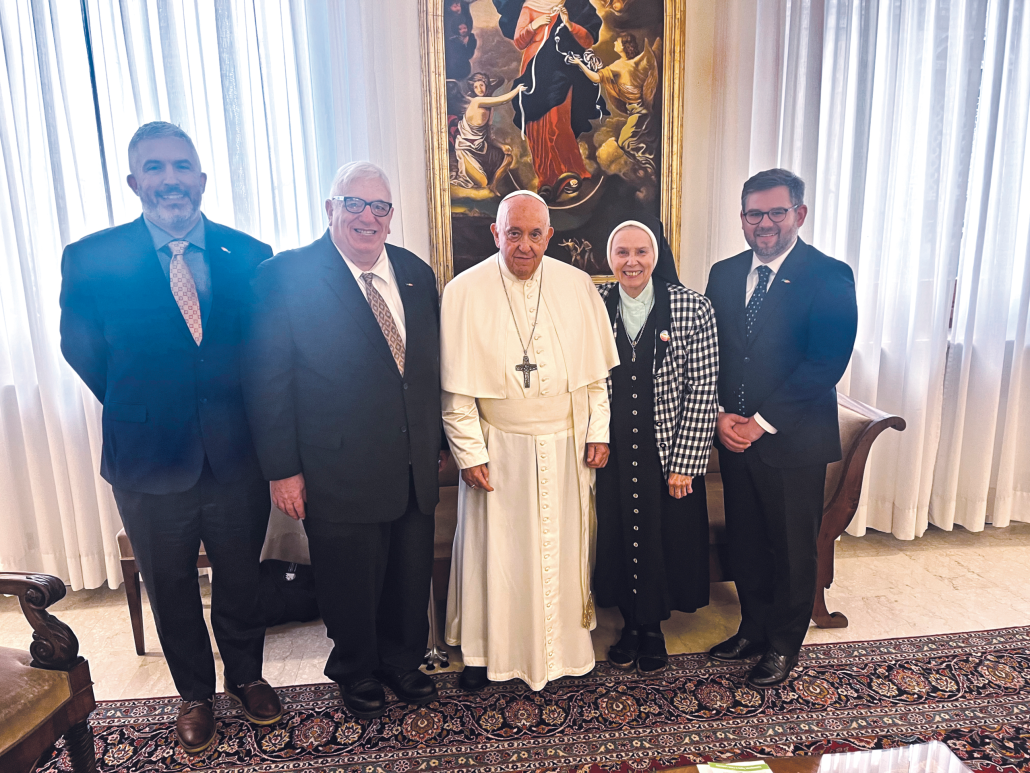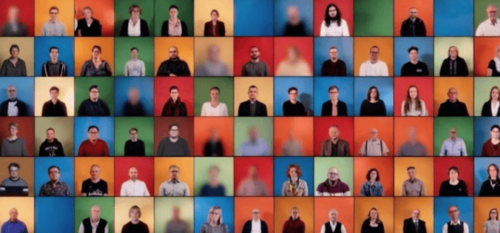While the first General Assembly of the Synod on Synodality has now concluded, the universal Synod is not yet finished. Next October, delegates will gather once again in Rome to close what has been an extraordinary multi-year process of listening and discerning among lay people and church hierarchy.
Following her meeting with Pope Francis at the Vatican on October 17, Outreach spoke with Sister Jeannine Gramick, S.L., the co-founder of New Ways Ministry, about her relationship with the pontiff and her thoughts on the ongoing synodal process. This interview, conducted via phone and email, has been edited for clarity, length and style.
Outreach: How was your meeting with the pope organized?
Jeannine Gramick, S.L.: I have been writing to Pope Francis and he’s been answering. I shared that correspondence with Cardinal [Wilton] Gregory, our bishop here in Washington, and he chuckled and said, “Oh, I see you’re pen pals.” I said, “Yes, we’re pen pals!” So I’ve been ‘pen-palling’ with Pope Francis for a couple of years now, since around April 2021. And I love him.
I have been writing to Pope Francis and he’s been answering.
The idea came from Frank [DeBernardo, the executive director of New Ways Ministry.] He said, “Why don’t you write to Pope Francis and ask him if you can come to see him during the Synod time?” And then he said, “And bring us along.” At first I said, no, the pope is so busy with the Synod. But I gave it some thought, and in September, I wrote to ask him. He wrote back right away and said, “Oh yes, I would be happy to see you.” And then I wrote back and said, “And how about seeing Frank and Bob [Shine] and Matt [Myers], who also work with us?” And the pope said, “Yes, come! Come!”
What was most surprising to you about the meeting, other than that it happened at all?
When I thought about the meeting before it happened, I started to cry. And I thought, oh my gosh, I’ll probably cry when I see him. But I didn’t, so I was surprised that I didn’t cry. But my feeling was really overwhelming joy and happiness. I told the pope as soon as I got there, and I had already written this in a letter, “You are the face of God to me.” And he said, “God’s face isn’t that ugly!”
What was surprising was my reaction, and then his reaction, which was one of humor. His initial reaction was delight that we were there and then a humorous rejoinder to my remark.
I think about 1999. And in less than 25 years, you have gone from being publicly reprimanded by the Vatican to meeting with a grateful and gracious pope.
Very gracious.
What does this say to you about change in the Catholic Church?
It surprises me that it’s happened in my lifetime, but change does not surprise me. I love church history, and if you know church history you know there’s been exceedingly great amounts of change, besides slavery and usury. The sexual ethics of the church have changed. They are not what they were in the time of Saint Paul, nor Saint Augustine, nor the Middle Ages. But we have this idea that sexual sins are the greatest sins. That was not always the way sexuality was thought of.
Disagreement can be healthy for the church, and not all disagreements are good. But we need, as Pope Francis is saying, to discern.
I like to say, when I present something about sexual ethics, that Augustine taught if a husband and wife had sexual intercourse and didn’t have a child as a result, that act was sinful—but only venially sinful because they were married. If you said that now, people would laugh at you. But that’s an example that the church has changed. And it’s always changed because there have been voices that questioned, voices that said, “That doesn’t resonate with reality or with people’s experiences.” Dissent, and sometimes that’s a dirty word—What’s a nice word for dissent?
Disagreement?
That’s a wonderful word. Disagreement can be healthy for the church, and not all disagreements are good. But we need, as Pope Francis is saying, to discern. In the Synod, all the different voices are being listened to, and some of them are very contradictory voices, but we listen respectfully. In time, the Spirit will let us know what direction to go in. I do think that the Spirit is working now in the church in terms of sexuality, and not just homosexuality.
What is your reaction to Synod members discussing LGBTQ topics, but ultimately not including any reference to LGBTQ people in the synthesis report?
While I am disappointed about the paucity of remarks about LGBTQ people in the final document, I’m not surprised. Most U.S. Catholics and Catholics in other parts of the Western church have become more accepting of LGBTQ people in the last few decades. Their LGBTQ friends and family members have shared their experiences, and they are more aware of current scientific thinking about gender and sexuality. Unfortunately, this is not the case for many, perhaps most, bishops in the United States and other parts of the world.
Most U.S. Catholics and Catholics in other parts of the Western church have become more accepting of LGBTQ people in the last few decades.
I, too, find change difficult. I often like the “old ways” better! But “all the works of God proceed slowly and in pain, but their roots are the sturdier and their flowering the lovelier.” These words. from the foundress of the School Sisters of Notre Dame, can comfort traditionalists as well as those who are eager for change. These words mean surrender to the will of God, a very traditional teaching.
Is it realistic or wise for Catholics to believe there will be substantial change in church teaching on homosexuality?
I think in the long run … Pope Francis is laying the groundwork for change in sexuality. My hope is that people won’t be disappointed [in the Synod] because there won’t be concrete changes. I don’t think that is the purpose of the Synod. The purpose of the Synod is to have conversations with each other: to listen and to speak, to learn how to be a dialogic church. The Holy Spirit will let us know when the time is right.
LGBT people say to me, “I love Pope Francis, but he hasn’t changed the teaching of the church.” And I say to them, “That is not his job.” His job is to articulate the faith of the people. How do we know what our people think and believe if we don’t listen and they don’t speak? That’s what Pope Francis is trying to do, to get people comfortable in sharing their experience. It may take several years or maybe a decade, I don’t know, but in God’s due time, I am confident that the sexual teaching of the church will change.
Some LGBTQ Catholics have criticized the lack of openly gay participants in the Synod. I’m wondering if you see that as an oversight, and what openly gay Catholics might bring to the table.
I don’t know if it’s an oversight or not. There are lesbian and gay people at the Synod as delegates. [Father] Bryan Massingale likes to say: “There’s a difference between being open and being public.” So I think a number of them probably have been open at the Synod, sharing that with the other delegates they’re talking with.
How do we know what our people think and believe if we don’t listen and they don’t speak?
But maybe they haven’t been public about it, like in the newspaper. What they can bring to the Synod is their experience, and that is so important. Sexual ethics change because theologians must take into account people’s experiences. So what is most important that [LGBTQ people] bring is their stories. And that’s how we can hope to see people’s hearts change, by listening to stories of what people go through in life.
Many religious and lay women are, for the first time, voting members at the Synod. What do you think this means for women in the church?
Well it certainly is a step forward, but I would say it’s a baby step forward. I think Pope Francis is very wise and he’s not rushing things. But it’s a mark—finally—that we are beginning to take [seriously] Saint Paul’s Epistle to the Galatians 3:28: In Christ, there is neither male nor female, Greek nor Jew. It’s a mark that we are finally acknowledging that women have a rightful place in the church.




